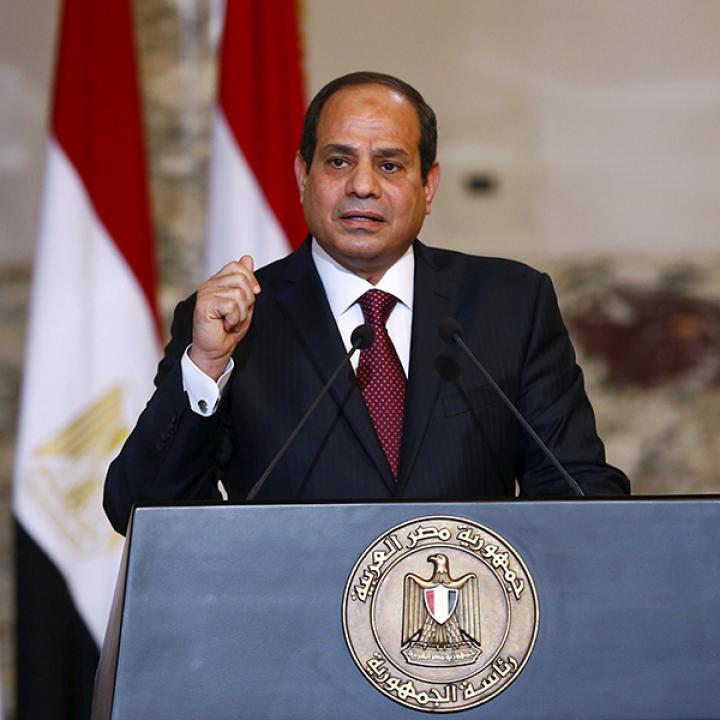
- Policy Analysis
- Policy Alert
How Cairo Can Help Ease the Israeli-Palestinian Crisis

Washington should welcome Egypt’s desire to restore its role as a peace mediator, but only if both governments are willing to formulate a constructive approach that avoids repeating the mistakes of the Mubarak era.
On May 16, Secretary of State Antony Blinken held a phone call with Egyptian foreign minister Sameh Shoukry to discuss the developing situation between Israel and the Palestinians. Cairo has already presented ceasefire proposals to both sides and dispatched security delegations to Jerusalem and the Gaza Strip, but the current flare-up also presents a broader opportunity for Egyptian officials to revitalize their regional role with American support.
Indeed, Cairo’s opportunities to prove its importance and utility on this front are rare. The Biden administration has largely ignored President Abdul Fattah al-Sisi since taking office, and the Egyptian role in the peace process has been on the wane for years. No serious Israeli-Palestinian talks have taken place since 2014, and Qatar and Turkey have diluted Cairo’s influence over Hamas by funding and hosting the group’s members, respectively. The recent Arab normalization wave with Israel has had a similarly marginalizing effect on Egypt, which is unable to offer the same rich bilateral incentives as the Gulf states. In fact, Gulf leaders seem to be deliberately avoiding the Egyptian model of cold peace with Israel.
As a result, Cairo’s role has been reduced to mediating short-term ceasefires when escalation gets out of control. Yet Egyptian officials should be encouraged by the fact that Israel has insisted on keeping them in the loop—otherwise, Doha and Ankara could have taken over this marginal role as well.
Closing Mubarak’s Diplomacy Playbook
Thus far, Sisi’s government has imitated what former president Hosni Mubarak used to do whenever Israeli-Palestinian violence erupted in the 1990s and 2000s. On the one hand, this strategy involves sending security delegations to both sides to broker a temporary ceasefire, offering to treat injured Palestinians in Egyptian hospitals, and delivering humanitarian aid. On the other hand, Egyptian officials have issued harsh public statements blaming Israel alone for the escalation, with Shoukry excoriating “Israeli aggression” against holy places in Jerusalem. State media are echoing this unhelpful rhetoric—on May 14, for example, well-known imam Ahmed Omar Hashem delivered a nationally televised sermon calling for an Islamic bloc to restore control over Jerusalem’s al-Aqsa Mosque by force. Meanwhile, anti-Semitic diatribes by pro-government broadcast hosts, newspapers, and clerics in Egypt have become even more vicious.
Gulf governments were understandably emotional about the violence taking place at al-Aqsa as well. Yet their public stance on the matter became more objective and nuanced once Iranian-backed Hamas started firing rockets at Israel. For example, Anwar Gargash, an advisor to Emirati president Sheikh Khalifa bin Zayed, issued a tweet condemning militants for “exploiting the suffering of the Palestinian people for narrow and unworthy calculations,” while influential religious figures such as Waseem Yousef criticized Hamas for using civilians as human shields. In the media, articles have been penned to defend Gulf leaders against accusations of abandoning the Palestinian issue, and some outlets have given Israeli officials a platform to defend their country’s position (e.g., Avichay Adraee, the head of Arab media in the Israel Defense Forces Spokesperson’s Unit).
Egypt is an important U.S. partner in any attempt to de-escalate Israeli-Palestinian tensions—the fact that it borders Gaza, controls the Rafah crossing, and holds longtime relations with different Palestinian factions gives it substantial leverage to orchestrate ceasefires. Yet the Biden administration should frankly communicate to Cairo that repeating Mubarak’s playbook toward Israel will not work if it wants to play a constructive role in regional peace talks. Aggressive government-sponsored rhetoric only adds fuel to the fire among the Egyptian and wider Arab publics. Instead, Cairo needs to adopt a more balanced position, condemning Hamas rockets that kill Israeli civilians as much as it condemns Israeli actions.
If Egypt continues on its current course, the negative effects will be felt in Gulf capitals, which will face more pressure to change their tone. Gulf countries that recently reached normalization agreements with Israel have been criticizing Hamas’s reckless behavior—for example, the UAE released a balanced statement mourning Israeli and Palestinian victims and calling for de-escalation and coexistence. Yet these governments may soon feel compelled to adopt more aggressive and unhelpful stances that heighten international pressure on Israel and undermine U.S. interests in the region.
American officials should also note that hateful language toward Israel and Jews only serves Iran and its destabilizing, anti-normalization camp. Egyptian leaders seem to regard such media rhetoric as a way of boosting their domestic legitimacy, but this view is shortsighted—after all, years of public incitement against Israel did not prevent the people from bringing down Mubarak.
In return for a tonal shift, Washington could offer to support Cairo in taking the driver’s seat on Israeli-Palestinian matters, minimizing Qatar and Turkey’s role. This may include promoting Egypt as a host for diplomatic conferences related to Gaza, which would likely boost Sisi’s standing domestically and regionally. Lastly, all of these efforts would be enhanced by more high-profile U.S. initiatives to encourage further normalization deals between Israel and Arab/Muslim-majority countries.
Haisam Hassanein is a Middle East analyst and a former Glazer Fellow with The Washington Institute.


